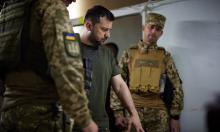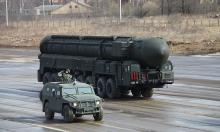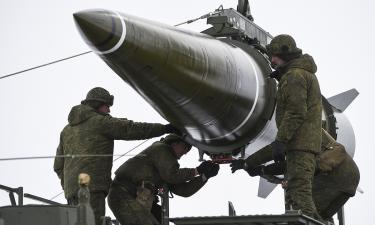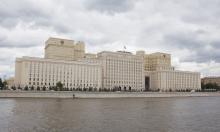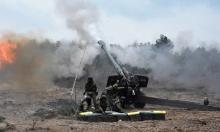Lebanon’s Hezbollah delivers bodies of 2 soldiers to Israel
Lebanon's Hezbollah guerrillas handed over the bodies of two Israeli soldiers and trucks carrying the remains of some 199 Lebanese and Palestinian fighters began crossing into Lebanon on Wednesday - setting in motion a dramatic prisoner swap between the bitter enemies.
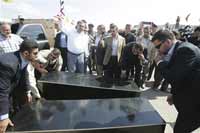
Family and friends outside the homes of the two captured Israeli soldiers burst into tears early Wednesday when TV images showed two black coffins believed to contain their remains. Though officials had suspected Ehud Goldwasser and Eldad Regev were dead, the sight of the coffins was the first concrete sign of the young men's fate.
The swap - mediated by a U.N.-appointed German official who shuttled between the sides for 18 months _ is likely to be a significant boost for Hezbollah at a time when the guerrillas are regaining their footing following the blows they suffered in a 2006 war against Israel. It also closes a painful chapter for Israel, which launched the war in response to the soldiers' capture in a cross-border raid.
Israeli forensic experts worked to identify the Israelis' bodies, a process that could take several hours, said Israeli army spokeswoman Avital Leibovich. Once the Israelis' bodies are positively identified, Israel will turn over five Lebanese prisoners to Lebanon's Hezbollah guerrilla group - including a militant convicted in an attack perceived here as particularly monstrous.
Lebanon's Al-Manar TV quoted senior Hezbollah official Wafik Safa at the border as saying the bodies of the two Israelis were in a "mutilated" shape from injuries they suffered during the 2006 cross-border raid. Israel's Channel 10 TV cited military forensic officials as saying the identification process could take a while because the bodies were in poor condition and required DNA testing.
The soldiers' Hezbollah captors had withheld any information about them since they were taken.
An aunt of Regev's sank to the ground when she saw the coffins appear on a small TV hooked up outside the soldier's father's house. Some 50 friends, neighbors and family who had gathered there sobbed, rocked back and forth in prayer, lit candles or tugged at their hair. "Nasrallah, you will pay," several of the mourners vowed, referring to Hezbollah leader Sheik Hassan Nasrallah.
The family's next door neighbor, Simona Adda, 68, said her children had grown up with Regev. "It's the saddest day for Israel. They kept us waiting until the last second to learn the fate of our sons," she said, then burst out crying. Other people in the crowd criticized Israeli Prime Minister Ehud Olmert, saying the soldiers died for nothing, and vowed revenge against Nasrallah.
Olmert waged a much-criticized monthlong war against Hezbollah in 2006 after the Israeli soldiers were taken.
The sorrow that swept across Israel with the images of the coffins contrasted sharply with the hero's welcome that awaited convicted killer Samir Kantar upon his return to a homeland he left 29 years ago to set out on his deadly mission.
In the Gaza Strip, controlled by the violently anti-Israel Hamas group, people celebrated in the streets and handed out sweets in support of Hezbollah.
"Today is a great victory for the resistance movements and to Hezbollah," said Hamas spokesman Sami Abu Zuhri. "It shows that the only successful way to free the prisoners is by kidnapping soldiers."
Mark Regev, spokesman for the Israeli prime minister, condemned the celebrations.
"Samir Kantar is a brutal murderer of children and anybody celebrating him as a hero is trampling on basic human decency," he said.
Putting aside decades of resistance and breaking what had been a long-held taboo, Israel's Cabinet gave final approval on Tuesday to free Kantar. But he and Israel's four remaining Hezbollah prisoners from the 2006 war won't be handed over to Red Cross representatives at the Rosh Hanikra border crossing until Israeli forensic experts positively identify the soldiers.
The border crossing area was declared a closed military zone until the swap, codenamed "And the sons shall return," is completed.
"It's a very difficult day for us," said Regev's father, Zvi, before the coffins were shown. A large, framed photograph of Eldad hung at the entrance to his father's house in Kiryat Motzkin, a coastal town an hour south of the Lebanese border. On the upper left hand side appeared the message, "Eldad, we haven't forgotten, and we're waiting for the day you return home."
Israel had refused for decades to free Kantar, hoping to use him as a bargaining chip to win new information about an Israeli airman whose plane crashed in Lebanon in 1986. But despite dissatisfaction over new information about his fate provided over the weekend by Hezbollah, and under pressure from the captured soldiers' families to bring them home, Israel's Cabinet voted on Tuesday to release Kantar.
Although polls show Israelis solidly endorse the exchange, many see Kantar as the embodiment of evil.
In the dead of night on April 22, 1979, Kantar and three other gunmen made their way in a rubber dinghy from Lebanon to the sleepy Israeli coastal town of Nahariya, 5 miles (8 kilometers) south of the Lebanese border. There, in a hail of gunfire and exploding grenades, they killed a policeman who stumbled upon them, then burst into the apartment of Danny Haran, herding him and his 4-year-old daughter out of the house at gunpoint to the beach below, where they were killed.
The attack is seared in Israel's collective consciousness as being especially gruesome because an Israeli court found that Kantar shot Danny Haran in front of his child, then killed her by hitting her head with his rifle butt.
Haran's wife, Smadar, who had fled into a crawl space in the family apartment with her 2-year-old daughter, accidentally smothered the child with her hand while trying to stifle her cries.
Kantar, who acted on behalf of a militant Palestinian faction, denies killing the older child and has never expressed remorse over the incident. He was 16 years old at the time.
Two members of his squad were killed in the raid, and the third, taken alive, was released in a 1985 prisoner swap. But Israel held on to Kantar for decades, hoping to use him as a bargaining chip to wring some information about the missing Israeli airman, Ron Arad.
In addition to the prisoners, Israel also has agreed to release the bodies of 199 Lebanese and Palestinian fighters killed in clashes over the years. Red Cross trucks bearing the bodies also began moving toward the border early Wednesday
The deal seals a painful chapter from Israel's inconclusive war against the Iranian-backed Hezbollah, launched with the declared aim of returning the captured soldiers.
On Tuesday, Hezbollah's commander in south Lebanon, Sheik Nabil Kaouk, called the swap an "official admission of defeat" for Israel. Red, white and green Lebanese flags, yellow Hezbollah flags and welcome banners hung in south Lebanese villages where the coffins carrying the returned bodies will be driven in a convoy from the border toward the capital, Beirut.
Hezbollah supporters have set up a makeshift stage in the coastal town of Naqoura, where a brass band awaited the returning prisoners. On the platform stood a large photograph of a weeping Israeli woman. A nearby sign read, "Israel is shedding tears of pain."
"Lebanon is shedding tears of joy," read another.
An official ceremony will follow at Beirut Airport and will be attended by Lebanon's president, prime minister and parliament speaker. Later, Hezbollah leader Hassan Nasrallah is to address what is expected to be a huge celebration at the group's stronghold south of Beirut.
The exchange is a somber occasion in Israel, where no ceremonies are planned.
Critics have said that by trading bodies for prisoners, Israel is giving militants little incentive to keep captured soldiers alive. This concern is an immediate and powerful one because Palestinian militants in the Gaza Strip are holding a third Israeli soldier, also seized two years ago but believed to be alive.
It was not clear if Regev and Goldwasser were killed in Hezbollah's cross-border raid or if they died in captivity. Evidence at the scene indicated each was seriously wounded.
This would not be the first time that Israel has paid a high price to return its troops. On several occasions, it released hundreds or thousands of prisoners in exchange for small numbers of Israeli soldiers, some of them dead.
A U.N.-appointed German official mediated the swap agreement after 18 months of shuttling between the two sides, which shun each other.
Israeli President Shimon Peres took the first formal step to activate the swap by pardoning Kantar on Tuesday evening.
Subscribe to Pravda.Ru Telegram channel, Facebook, RSS!
